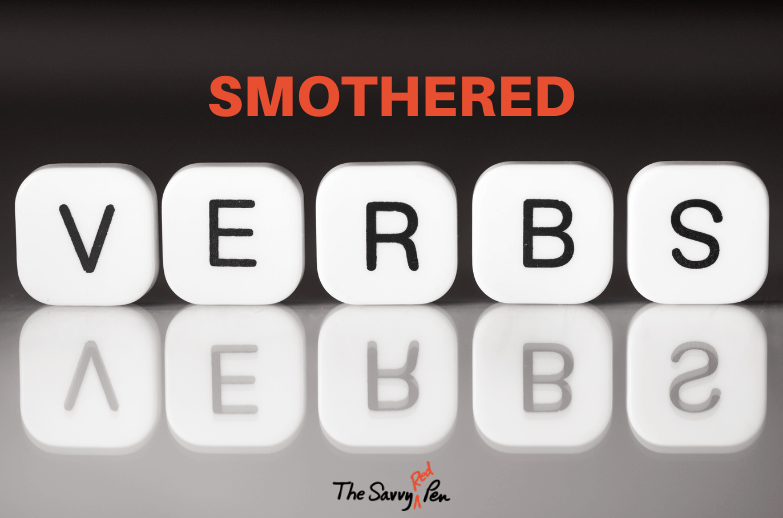Effective writing is clear and concise, right? In a previous blog and my eBook, 10 Tips to Self-Edit a Book, I offer Cut It Out! as a strategy to get rid of extraneous, meaningless words. These include very and really and fluff like due to the fact that instead of because. Here’s another culprit of verbosity: smothered verbs. Ever heard of them? You may not be familiar with the term, but I’m sure you’ve come across them or even crafted some of your own, especially in business or academic writing. Here’s a look at what smothered verbs are, why they’re a problem in your writing, and how to avoid using them.
What Are Smothered Verbs?
We create smothered verbs when we take an action verb and turn it into a noun by creating a noun phrase (often a verb + preposition + article + noun). All that grammar talk translates into a surplus of words when fewer will do. Consider, for example, a delicious plate of smothered chicken. The chicken lies (the verb) on the plate, covered in peppers, onions, mushrooms, and cheese (preposition + article + noun). While it makes for a delicious entrée, smothering your verbs makes for confusing, overly verbose writing.
Often, people think their writing is more sophisticated and impressive when they write using this style, but they’re not being direct. Smothered verbs are yearning to be free so the action can be strong. Technically, they are grammatically correct, but your reader will have a more positive experience instead of rolling eyes and sighing, “Ugh.”
Smothered verbs are a matter of style. Eliminating them creates more effective communication.
Examples of Smothered Verbs and How to Fix Them

A perfectly good verb is hiding in that noun phrase somewhere. To identify smothered verbs in your writing, look for nouns ending in –ion, –tion, –able, –ance, -ence, –ment, or -ity. Common examples are “make a decision” instead of “decide” and “come to an agreement” instead of “agree.”
Here’s a tip to find smothered verbs in your own writing if you’re not sure how to find them: Do a search or find for words ending in these letters.
First, we’re talking about a form of an action verb, not a state of being or helping verb.
Smothered Verb:
“The team will perform an assessment of the project.”
The hiding verb is assess.
More concise:
“The team will assess the project.”
Smothered Verb:
“We will provide information to our clients.”
The hiding verb is inform.
More concise:
“We will inform our clients.”
Smothered Verb:
“We’re here to conduct an investigation.”
The hiding verb is investigate.
More concise:
“We’re here to investigate.”
Eliminating smothered verbs from your writing will make your prose more direct and easier to understand.
So, uncover your smothered verbs! The poor verbs are buried alive, screaming to get out! Noun phrases (i.e., smothered verbs) use more words and burden your sentences. Your writing will be shorter and pack more power, and your reader will appreciate your direct communication.
Want more writing tips like these? Subscribe to The Savvy Red Pen Blog! We also offer a full suite of editorial services. Contact us today to discover how we can help you!
Related Articles
Cut It Out: Tips to Declutter Your Writing
Funny—but Not so Funny—Dangling & Misplaced Modifiers
The 10 Best Grammar & Writing Resources for Your Writer’s Toolbox


I am the queen of smothering. This is a wonderful article. Thank you!
I get it. I am guilty of it too and need the reminder, especially in biz correspondence.